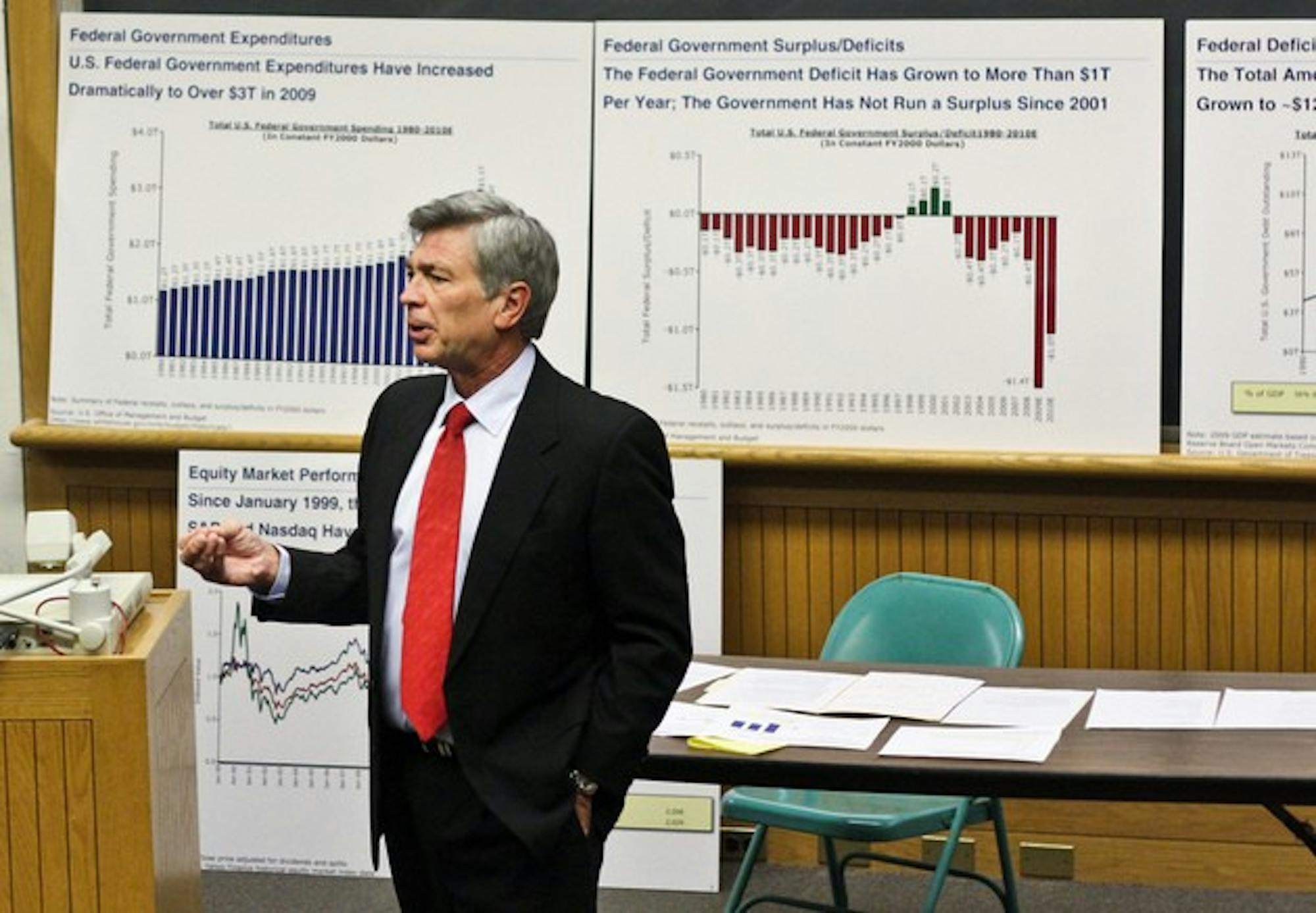Government downsizing and congressional pay cuts will help the United States reduce the federal deficit, Jim Bender, a Republican candidate in the 2010 New Hampshire U.S. Senate primary, told a group of Dartmouth students gathered in the Rockefeller Center on Wednesday evening. The audience was comprised largely of members of the Dartmouth College Republicans.
In his lecture, Bender primarily focused on the national fiscal crisis and perceived corruption in the U.S. government.
A former entrepreneur with extensive experience on Capitol Hill, Bender said he decided to enter politics after becoming frustrated with ongoing government inefficiency.
"[There is] no argument that the government spends too much, wastes too much, taxes too much and is virtually inefficient in everything that it does," Bender said.
Using three charts labeled "Federal Government Expenditures," "Federal Government Surplus/Deficits" and "Federal Deficits," Bender explained what he saw as the dangerous rise in national debt. The graphs showed that U.S. has run at a deficit since 1969. The national debt is currently six times U.S. tax revenue, Bender said.
This persistent debt means that the value of the dollar will continue to fall, Bender said, adding that both the currency decline and the substantial debt will likely have severe international ramifications.
Bender also criticized the government's plan to borrow an additional $9 trillion over the next 10 years.
"From a pure business decision, it's not going to happen," he said. "Interest rates are gong to go up."
Wasteful spending by the executive branch sets a poor example for federal spending as a whole, Bender warned.
"When the government organization sees that the president is living like a king and going to Manhattan to have a date night, Congress sees this and goes, We're special too!'" he said.
Bender questioned the necessity of Congress' recent decision to upgrade its private aircraft.
"[We] had to pay half a billion dollars so they could have better private aircraft," he said.
A smaller government, comparable to Eisenhower's 1960 administration, will increase national prosperity, Bender said.He emphasized that industry, not the government, is responsible for the creation of wealth.
"The government was small in 1960," he said, explaining that the United States at the time was rebuilding on an international scale and creating "a great deal of wealth."
"Big government is toxic to the engines that drive American wealth," he said.
Bender blamed mistakes by the Securities and Exchange Commission for the corruption on Wall Street, particularly the Bernie Madoff and Jeff Skilling scandals. Bender claimed that the SEC "failed miserably" at monitoring business affairs.
"We have to trust the system," he said. "We have to trust capitalism."
As for American involvement in the Middle East, Bender said that the United States deserves compensation for its efforts.
"I think the U.S. should have years of $20 a barrel of oil to pay us for being there," he said. "It's reasonable to say that if we have to go in and spend our nation's blood and treasure, that should be paid for. Once the dividends from oil start coming in, [Iraq] is going to love Wal-Mart and Starbucks."
This spread of American businesses and the subsequent increase in international trade could promote world peace, Bender said.
"The free market is the answer," he said. "War becomes impossible too many interests on each side."
Danny Kim '11, president of the College Republicans, said he found Bender's talk rational and pragmatic.
"He knows the dangers. He knows the predicament," Kim said. "His approach to the economy is very realistic, and that's what we like to see."
Kunal Malkani '12, the College Republicans' vice president, however, noted that the group does not endorse a specific candidate for the primary.
"This was more informational, so that our members could get an idea of the issues in the campaign," he said.




